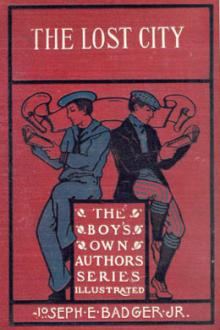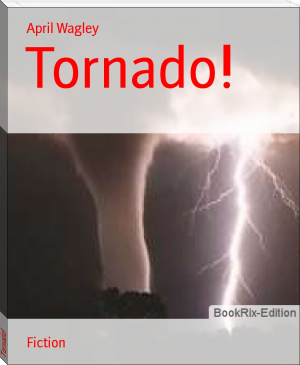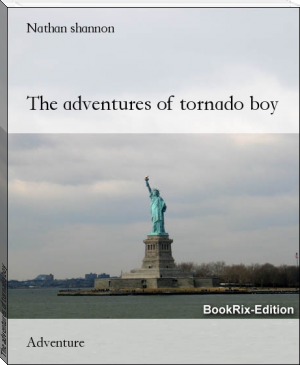The Lost City - Jr. Joseph E. Badger (children's books read aloud txt) 📗

- Author: Jr. Joseph E. Badger
- Performer: -
Book online «The Lost City - Jr. Joseph E. Badger (children's books read aloud txt) 📗». Author Jr. Joseph E. Badger
colts in fresh pasture, this morning,” brightly apologised Bruno,
for both.
Apparently the professor paid no attention to that bit of
sparring between his nephews, staring into the glowing camp-fire
with eyes which surely saw more than yellow coals or ruddy flames
could picture; eyes which burned and sparkled with all the fires
of distant youth.
“The dearest dream of all my life!” he repeated, in half dreamy
tones, only to rouse himself, with a a start and shoulder shake,
an instant later, forcing a bright smile as he glanced from face
to face. “And why not? How better could my last years be
employed than in piercing the clouds of mystery, and doubt, and
superstition, with which this vast tract has been enveloped for
uncounted ages?”
“Is it really so unknown, then, uncle Phaeton?” hesitatingly
asked Bruno, touched, in spite of himself, by that intensely
earnest tone and expression. “Of course, I know what the Indians
say; they are full of a rude sort of superstitious awe, which—”
“Which is one of the surest proofs that truth forms a foundation
for that very superstition,” quickly interjected the professor.
“It is an undisputed fact that there are hundreds upon hundreds
of square miles of terra incognita, lying in this corner of
Washington Territory. No white man ever fairly penetrated these
wilds, even so far as we may have been carried while riding the
tornado. Or, if so, he assuredly has never returned, or made
known his discoveries.”
“Provided there was anything beyond the ordinary to see or
experience, shouldn’t we add, uncle?” suggested Waldo, modestly.
“There is,—there must be! No matter how wildly improbable their
traditions may seem in our judgment, it only takes calm
investigation to bring a fair foundation to light. In regard to
this vast scope of country, go where you will among the natives,
question whom you see fit, as to its secrets, and you will meet
with the same results: a deep-seated awe, a belief which cannot
be shaken, that here strange monsters breed and flourish, matched
in magnitude and power by an armed race of human beings, before
whose awful might other tribes are but as ants in the pathway of
an elephant.”
Waldo let escape a low, prolonged whistle of mingled wonder and
incredulity, but Bruno gave him a covert kick, himself too deeply
interested to bear with a careless interruption just then.
“Of course there may be something of exaggeration in all this,”
admitted the enthusiastic professor. “Undoubtedly, there is at
least a fair spice of that; but, even so, enough remains to both
waken and hold our keenest interest. Listen, and take heed, my
good lads.
“You have often enough, of late days, noticed these mountains,
and if you remark their altitude, the vast scope of country they
dominate, the position they fill, you must likewise realise one
other fact: that an immense quantity of snow in winter, rain in
spring and autumn, surely must fall throughout the Olympics.
Understand?”
“Certainly; why not, uncle Phaeton?”
“Then tell me this: where does all the moisture go to? What
becomes of the surplus waters? For it is an acknowledged fact
that, though rivers and brooks surely exist in the Olympics, not
one of either flows away from this wide tract of country!”
The professor paused for a minute, to let his words take full
effect, then even more positively proceeded:
“You may say, what I have had others offer by way of solution,
that all is drained into a mighty inland sea or enormous lake.
Granting so much, which I really believe to be the truth as far
as it goes, why does that lake never overflow? Of all that
surely must drain into its basin, be that enormously wide and
deep as it may, how much could ordinary evaporation dispose of?
Only an infinitesimal portion; scarcely worth mentioning in such
connection. Then,—what becomes of the surplusage?”
Another pause, during which neither Gillespie ventured a
solution; then the professor offered his own suggestion:
“It must flow off in some manner, and what other manner can that
be than—through a subterranean connection with the Pacific
Ocean?”
Bruno gave a short ejaculation at this, while Waldo broke forth
in words, after his own particular fashion:
“Jules Verne redivivus! Why can’t WE take a trip through the
centre of the earth, or—or—any other little old thing like
that?”
“With the tank of compressed air as a life-preserver?” laughed
Bruno, in turn. “That might serve, but; unfortunately, we have
only the one, and we are three in number, boy.”
“Only two, now; I’m squelched!” sighed the jester, faintly.
If the professor heard, he heeded not. Still staring with vacant
gaze into the fire, his face bearing a rapt expression curious to
see, he broke into almost unconscious speech:
“An enormous inland sea! Where float the mighty ichthyosaurus,
the megalosaurus, in company with the gigantic plesiosaurus! Upon
whose sloping shores disport the enormous mastodon, the
stately megatherium, the tremendous—eh?”
For Waldo was now afoot, brandishing a great branch broken from a
dead tree, uttering valiant war-whoops, and dealing tremendous
blows upon an imaginary enemy, spouting at the top of his voice a
frenzied jargon, which neither his auditors nor himself could
possibly make sense out of.
Bruno, ever sensitive through his affectionate reverence for
their uncle, caught the youngster, and cast him to earth,
whereupon Waldo pantingly cried:
“Go on, please, uncle Phaeton. It’s next thing to a museum and
menagerie combined, just to hear—”
“Will you hush, boy?” demanded Bruno, yet unable to wholly
smother a laugh, so ridiculous did it all sound and seem.
But Professor Featherwit declined, his foxy face wrinkling in a
bashful laugh. Whether so intended or not, he had been brought
down to earth from that dizzy flight, and now was fairly himself
again.
“Well, my dear boys, I dare say it seems all a matter of jest and
sport to you; yet, after our riding in the centre of a tornado
for uncounted miles, coming forth with hardly a scratch or a
bruise to show for it all, who dare say such things may not be,
even yet?”
“But,—those strange creatures are gone; the last one perished
thousands upon thousands of years ago, uncle Phaeton.”
“So it is said, and so follows the almost universal belief. Yet
I have seen, felt, cooked, tasted, and ate to its last morsel a
steak from a mammoth. True, the creature was dead; had been
preserved for ages, no doubt, within the glacier which finally
cast it forth to human view; yet who would have credited such a
discovery, only fifty years ago? He who dared to even hint at
such a thing would have been derided and laughed at, pronounced
either fool or lunatic. And so,—if we should happen to discover
one or all of those supposedly extinct creatures here in this
terra incognita, I would be overjoyed rather than astounded.”
Bruno looked grave at this conclusion, but Waldo was not so
readily impressed, and, with shrugging shoulders, he made answer:
“Well, uncle, I’m not quite so ambitious as all that comes to.
May I give you my idea of it all?”
CHAPTER VIII.
A DUEL TO THE DEATH.
Professor Featherwit nodded assent, and, after a brief chuckle,
Waldo resumed:
“You can take all those big fellows with the jaw-breaking names,
but as for me, smaller game will do. Maybe a fellow couldn’t
fill his bag quite so full, nor quite so suddenly, but there
would be a great deal more sport, and a mighty sight less danger,
I take it!”
It was by no means difficult to divine that the professor had not
yet spoken all that busied his brain, but the thread was broken,
his pipe was out, and, emptying the ashes by tapping pipe-bowl
against the heel of his shoe, he rose erect, once more the man of
action.
“You will have to clear up, lads, for I must make such few
repairs as are necessary to restore the aerostat to a state of
efficiency. So long as that remains in serviceable condition, we
will always have a method of advance or retreat. Without
it—well, I’d rather not think of the alternative.”
That dry tone and quiet sentence did more than all else to
impress the brothers with a sense of their unique position. Back
came the remembrance of all they had gathered concerning this
strange scope of country since first settling down fairly within
the shadows of the Olympics, there to put that strange machine
together, preparing for what was to prove a wonder-tour through
many marvellous happenings.
Times beyond counting they had been assured by the natives that
no mortal could fairly penetrate that vast wilderness. Natural
obstacles were too great for any man to surmount, without saying
aught of what lay beyond; of the enormous animals, such as the
civilised world never knew or fought with; of the terrible
natives, taller than the pines, larger than the hills, more
powerful by far than the gods themselves, eager to slay and to
devour,—so eager that, at times, living flesh and blood was more
grateful than all to their depraved tastes!
“Do you really reckon there is anything in it all, Bruno?” asked
the younger brother in lowered tones, glancing across to where
their uncle was busily engaged in those comparatively trifling
repairs.
“It hardly seems possible, and yet—would the members of four
different tribes tell a story so nearly alike, without they had
at least a foundation of truth to go upon?”
“That’s right. And yet—the inland sea sounds natural enough. We
know, too, that there are such things as underground rivers,
outside of Jules Verne’s yarns. But those animals,—or
reptiles,—which?”
“Both, I believe,” answered Bruno, with a subdued laugh.
“That’s all right, old man. I never was worth a continental when
it came to such things. I prefer to live in the present, and
so—well, now, will you just look at that old cow!”
In surprise Waldo pointed across to where a bovine shape showed
not far beyond the pool at the base of the miniature waterfall;
but his brother had a fairer view, and, instantly divining the
truth, grasped an arm and hastily whispered:
“Hush, boy; can’t you see? It’s a buffalo, a hill buffalo,
and—”
“Quick! the guns are in the machine! Down, Bruno, and maybe we
can get a shot and—”
His eager whisper was cut short, though not by grip of arm or act
by his brother. A rumbling roar broke forth from the further
side of that mountain stream, and as the dense bushes beyond were
violently agitated, the hill buffalo wheeled that way with
marvellous rapidity.
Just as a long head and mighty shoulders spread the shrubbery
wide apart, jaws opening and lips curling back to lay great teeth
bare, while another angry sound, half growl, half snort, only too
clearly proclaimed that monster of the mountains, a grizzly bear.
“Smoke o’ sacrifice!” gasped Waldo, as the grizzly suddenly
upreared its mighty bulk, head wagging, paws waving in queer
fashion, lolling tongue lending the semblance of drollery rather
than viciousness.
“This way; to your guns, boys!” cautiously called out the
professor, whose notice had likewise been caught by those unusual
sounds, and who had already armed himself with his pet dynamite
gun.
“Careful! He’ll make a break for us at first sight, unless—down
close, and crawl for it, brother!”
Bruno set the good example, and Waldo was not too proud of spirit
to humble himself in like manner. Although this was their first
glimpse of “Old Eph” in his native wilds, both brothers
entertained a very respectful





Comments (0)